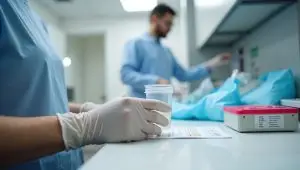Navigating the complexities of drug testing can be challenging, especially with the rise of cannabinoids like CBG, a lesser-known cousin of CBD and THC. Whether you're an employer ensuring workplace safety or a job seeker worried about the implications of cannabinoid use, understanding how CBG interacts with drug tests is crucial.
This guide will explore whether CBG shows up on drug tests, offer insights into various testing methods, and discuss related considerations such as THC lotion and mouth swabs. By providing up-to-date information, you'll be better prepared to handle drug testing scenarios in industries ranging from healthcare and transportation to hospitality and technology.
Key Takeaways
- Interest in cannabinoids like CBG is growing, prompting questions about their impact on drug tests for both employers and employees.
- Standard drug tests mainly focus on THC, so CBG itself typically does not cause positive results, but caution is needed with products that may contain traces of THC.
- Various drug testing methods, such as urine, mouth swabs, hair, and blood tests, have different detection capabilities and timelines that can affect results.
- Understanding industry-specific drug testing requirements is essential for employers and employees to navigate the potential implications of CBG use responsibly.
- Being informed about drug testing developments and maintaining open communication can help create fair workplace policies and ensure safety compliance.
Introduction
In recent years, interest in cannabinoids has exploded, with compounds like CBD and THC taking the spotlight. Now, CBG (cannabigerol) is emerging as the latest focus, piquing curiosity about its benefits and implications. As these compounds gain popularity, one key question looms: How do they affect drug tests? For both employers aiming to maintain a safe workplace and employees concerned about job security, understanding if and how CBG appears on drug tests is crucial.
Why is this important? In the workplace, drug tests are a tool to ensure safety and compliance. Employers need clear answers about whether CBG use could complicate this process. On the flip side, employees who use cannabinoids want to know if their jobs might be at risk, despite the legal and largely non-psychoactive nature of CBG.
This article sets out to unravel the mystery of CBG and drug testing. We'll tackle questions that swirl around this topic, debunk myths, and fill the gaps in understanding. Whether you're navigating company policy, personal wellness, or both, this guide aims to equip you with the knowledge you need.

Understanding CBG and Drug Tests
Cannabigerol, or CBG, is a cannabinoid much like its more famous relatives, CBD and THC. While most cannabinoid discussions center around the psychoactive THC and the non-psychoactive CBD, CBG sits at an interesting crossroads. It’s non-psychoactive, like CBD, and has various potential therapeutic benefits. Understanding CBG's properties also means understanding how—or if—it might appear on a drug test.
When it comes to drug testing, the focus is usually on detecting THC due to its psychoactive properties and legality issues in certain regions. Common drug testing methods include urine tests, mouth swabs, hair tests, and blood tests. Each has its own pros and cons: urine tests are most popular due to cost-effectiveness and detection periods; mouth swabs are less invasive and detect recent use; hair tests can show drug use over a longer period; and blood tests are the most precise but also the most invasive.
Now, the critical question: does CBG show up on these tests? As of current standards, drug tests typically do not screen for CBG explicitly. Their primary target is THC and its metabolites. However, this does not automatically grant CBG users immunity from testing concerns. Some cannabis products containing CBG may also have trace amounts of THC unless they are specifically labeled as THC-free. Thus, while CBG itself isn't a standard target for drug tests, consuming a poorly regulated or mislabelled product could potentially lead to unexpected results.
In summary, while CBG is currently unlikely to trigger a positive result on standard drug tests, it doesn’t completely remove testing worries, especially if there is potential for THC exposure from using CBG products. As cannabinoid regulations and testing technologies evolve, staying informed remains key.
Related Topics and Considerations
Will THC Lotion Show on a Drug Screen?
Let's get this straight: THC lotion isn't meant to enter your bloodstream like a traditional intake method would. It's designed for localized relief rather than a mind-altering experience. However, the concern lingers for those who frequently apply it—will it sneak into a drug test? Most likely, no. Standard drug screens look for THC that's been metabolized internally, typically from smoking or ingesting cannabis. Topical application generally doesn't result in enough THC absorption to cause a positive result. But be cautious; everyone's skin absorption rates differ, and high-concentration lotions could theoretically tip the scales.
Drug Mouth Swabs
When it comes to drug tests, mouth swabs are the flash testers. They're quick and adept at identifying recent use, making them popular among employers eyeing on-the-spot testing. But just how effective are they for cannabinoids? These swabs are mostly robust for detecting THC, thanks to its prevalence in the oral cavity shortly after consumption. As for other cannabinoids like CBG? The verdict is still out on their detectability in this manner, with most tests not specifically targeting non-psychoactive compounds. With swabs, it's really all about time—within that short detection window?
How Long Does It Take to Pass a Mouth Swab Test?
If you're pondering the timeline of passing a mouth swab test, consider the brevity. These tests generally reflect very recent use, with a usual detection window spanning up to 72 hours, though it's often much shorter for infrequent users. This means cannabinoids used days ago might not register, offering some relief to those who have consumed well ahead of test day. However, factors like individual metabolism and the specific substance used play roles in narrowing down that timeline. So, while mouth swab tests are sharp, their snapshot is fleeting.
Navigating Drug Testing in Various Industries
Drug testing requirements can vary dramatically across different industries, each with its own set of standards and expectations. Understanding these nuances is essential for both employers and individuals who may be subject to testing.
Non CDL DOT Physical Drug Test
For non-CDL drivers, navigating drug testing can be a bit different compared to their commercial counterparts. While these drivers may not be required to adhere to DOT drug testing regulations, many companies still implement drug testing as a part of their safety protocols. Whether CBG use could present an issue depends largely on a company’s specific drug testing policy and whether they test for cannabinoids beyond THC.
What Happens if You Fail a Drug Test?
A failed drug test can carry significant consequences, which can vary by industry and employer. Common outcomes might include disciplinary action, mandatory rehabilitation programs, or even termination. For those in safety-critical roles, the repercussions tend to be stricter. It's crucial to understand your rights and options in such situations, which may include retesting or discussing legitimate medical use with your employer.
Do Pre-Employment Drug Screens Test for Alcohol?
While pre-employment drug screenings commonly test for a panel of drugs, including THC, they don't always include alcohol. However, some employers might choose to test for alcohol depending on the nature of the job and industry, especially for roles involving safety-sensitive tasks. It's always a good idea to clarify with potential employers what substances will be tested during the screening process.
By understanding the specific drug testing requirements and potential implications for CBG use across various industries, individuals can better prepare themselves and make informed decisions regarding cannabinoid consumption. Employers can also tailor their testing policies to fit their industry’s needs while considering the evolving landscape of cannabinoid use.
Practical Insights for Employers and Employees
Preparing for a Drug Test
If you're anticipating a drug test, preparation is key. Be transparent with your employer about any legitimate cannabinoid use, including CBG. While CBG is less likely to appear on a drug test, full disclosure can prevent misunderstandings. It’s advisable to gather any supporting documentation, such as a doctor's note, if you’re using cannabinoids for medical purposes. Keeping communication open with your employer can mitigate potential issues down the line.
The Cost Factor
Understanding the financial implications of drug testing is essential for both employers and employees. On average, a standard urine drug screen can cost anywhere from $30 to $60, though prices can vary based on the panel's comprehensiveness. Factors such as location, the testing facility chosen, and whether additional, more sophisticated tests are required can all influence the final cost. For employers, negotiating bulk testing deals can be a cost-effective strategy.
Policies and Best Practices
When crafting effective drug testing policies, businesses should consider the evolving landscape of cannabinoid use. It's wise to clearly define what substances will be tested for, and under what circumstances exceptions may be granted. Employers should update their policies regularly to align with current laws and advances in drug testing technology. Encouraging a dialogue around cannabinoid use policies can improve workplace morale and create a fair and understanding environment.
Answering Common Questions
When it comes to drug testing, a few questions pop up more often than others. Let's tackle two common queries: the cost of a urine drug test and the requirements for non-CDL drivers.
Urine Drug Test Cost:
On average, a standard urine drug screening can cost anywhere from $30 to $60. This figure can vary based on factors like the number of substances being tested, the testing facility's location, and whether the test is part of a larger panel, such as pre-employment or random testing. Some employers might also include more comprehensive panels, which can bump the price up to $100 or more. It's essential for both employers and employees to understand what these costs cover, which typically includes specimen collection, laboratory analysis, and reporting.
Non CDL Driver Requirements:
For those in non-CDL driving positions, the requirements can be a bit different but still stringent. While these drivers don't need a Commercial Driver’s License, they are often subject to specific testing standards, especially if working under a DOT-regulated employer. Typically, these positions require a standard pre-employment drug screen and may include periodic or random testing, which primarily focuses on the use of illicit substances. It's vital for non-CDL drivers to be aware of these expectations to ensure both their compliance and safety on the job.
Conclusion
In summary, understanding the intricacies of CBG and its potential implications on drug tests is vital in today’s rapidly evolving landscape of cannabinoid use. While current evidence suggests that CBG is unlikely to show up in standard drug tests, awareness of this evolving field remains crucial. Employers can maintain a fair and secure workplace by staying informed, while employees can approach their opportunities with confidence.
It's important to remember that knowledge is power. Keeping abreast of developments in drug testing technology and regulations will ensure that both parties are well-prepared and informed. This understanding fosters a workplace culture rooted in both safety and fairness, bridging the gap between policy and individual rights.
With this comprehensive guide, you're equipped to navigate drug testing scenarios effectively. Whether you're an employer refining your policies or an employee considering cannabinoid use, staying educated about these aspects will serve you well. For further insights into workplace considerations, consider exploring resources such as guides on background checks and their implications on employment.
Additional Resources
- Background Checks & Drug Tests: Everything You Need to Know Before Hiring
- Does CBG Show Up on Drug Tests? Understanding Drug Testing Results
- Does CBG Show Up on Drug Tests? Understanding Cannabinoids and Testing
- Drug Mouth Swab Tests: How They Work and How to Pass
- Does CBD Show Up in Drug Tests? What You Need to Know

GCheck Editorial Team
Meet the GCheck Editorial Team, your trusted source for insightful and up-to-date information in the world of employment background checks. Committed to delivering the latest trends, best practices, and industry insights, our team is dedicated to keeping you informed.
With a passion for ensuring accuracy, compliance, and efficiency in background screening, we are your go-to experts in the field. Stay tuned for our comprehensive articles, guides, and analysis, designed to empower businesses and individuals with the knowledge they need to make informed decisions.
At GCheck, we're here to guide you through the complexities of background checks, every step of the way.





